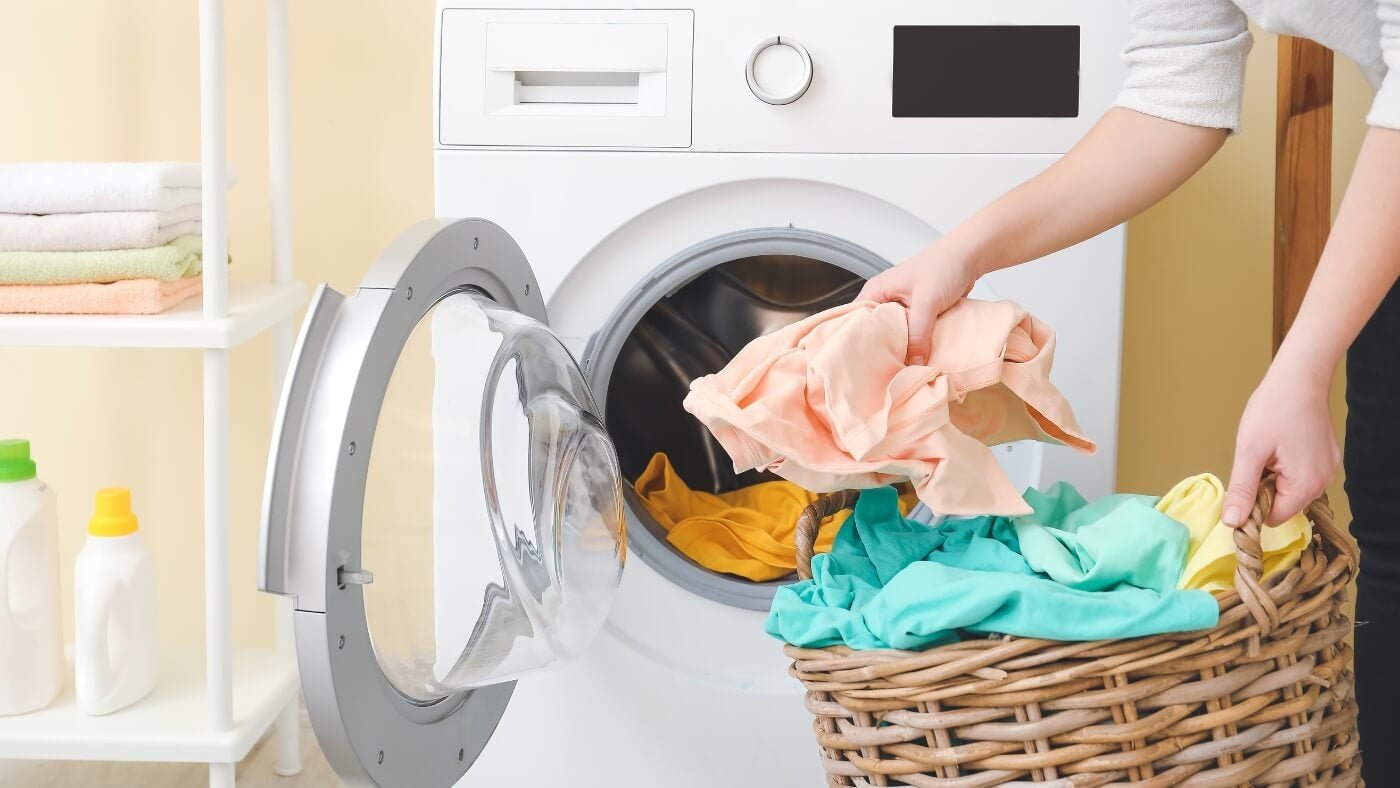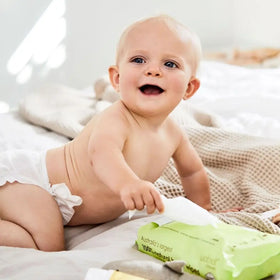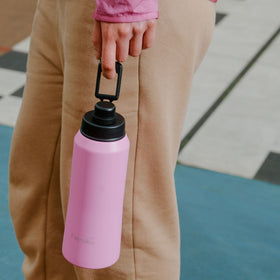
Should You Wash New Clothes Before Wearing Them?
For some people, washing new clothes before wearing them is a no-brainer. For others, clothes will never look better or brighter than when they're still shop-fresh. But are new garments clean? Should new clothes be washed before wearing them, or should you put them straight into the washing machine?
New clothes can harbour potentially harmful chemicals and germs despite their fresh appearance. Experts recommend washing new clothes before you wear them, especially if they will touch your skin or you think you will sweat in them. This easy step can lower your chances of getting skin irritation, allergies, or other health problems.
Here's why you should always wash new clothes, especially if they're for your little ones:

1. Because of the dyes and chemical finishes on new clothes
Traditionally, fabrics get their colour from azo dyes. These chemicals can induce severe skin reactions, particularly in children who are allergic to them.
Azo Dyes
Azo dyes, widely known for their high allergenic potential, have become less commonly used in fabric dyeing due to rising allergy rates. The European Union has banned these dyes, which led to a significant reduction in their use. Similarly, in Australia, the use of azo dyes has also become uncommon. This trend reflects the increasing concerns and awareness about the potential health risks associated with these dyes.
Disperse Dyes
It's crucial to understand that while azo dyes have been a major concern in the textile industry, other fabric dyes can also jeopardise human health. For instance, disperse dyes like Disperse Blue 106 and Disperse Blue 124, commonly found in garments, have been linked to allergic contact dermatitis. The American Contact Dermatitis Society even recognised Disperse blue dyes as the Contact Allergen of the Year in 2000.
The potential health risks of these chemicals are not limited to humans. They can also hurt the environment by contaminating air and water supplies.

Formaldehyde and other chemical treatments
Another reason to wash newly bought clothes, especially those made with synthetic materials, is that they may have been treated with formaldehyde. This chemical is known to be a carcinogen. Manufacturers use formaldehyde resin to prevent the clothes from wrinkling and to protect them from mould and mildew during shipping.
According to a study on formaldehyde exposure during early life, washed clothes do not contain any detectable formaldehyde, unlike unwashed ones. Therefore, washing clothing before using it for the first time is recommended. This simple practice can ensure the safety of consumers and minimise their exposure to harmful chemicals.
Many people are unaware that their new clothes may contain irritating residual chemicals left over from the manufacturing process. These can cause skin, eye, and nose irritation, particularly for individuals with sensitive skin or conditions such as eczema.
Even if you only purchase clothes made with natural fibres, you still have to wash them. Experts say even 100% cotton garments are treated with potentially irritating chemicals before being sold. That's why putting new clothes through the wash removes the extra dye that can otherwise end up on your skin or other garments.
2. Because new clothes are icky and can cause skin irritation
It's important to remember that your clothes may have been tried on by many people at the store and have been through many hands. Clothes often end up on dirty stockroom and change room floors. Have you ever tried on clothes when you are sweaty or have not washed your hands? Well, so has everyone else! And your new dress could be carrying other people's germs.
Scientists have discovered that new clothes can harbour respiratory secretions, yeast, and even faecal germs. This means that wearing contaminated clothing items can transmit diseases such as fungal infections, diarrhoea, MRSA, hepatitis A, salmonella, athlete's foot, and scabies. Another thing you can get from wearing unwashed new clothes is lice.
The general consensus says the number of germs on new clothes isn't normally enough to make us seriously ill. Although research has yet to prove or debunk this. Nevertheless, if your immune system is compromised, you can definitely catch a bug from wearing contaminated clothing, which may result in an immune system-related reaction.
It's never a good idea to risk your health by wearing new clothes without washing them first. Think about the many individuals who tried these clothes before you. It's always more effective to prevent potential health issues by washing your new clothes before wearing them.

3. Because babies are vulnerable to bugs and harsh chemicals
With their developing immune systems, babies are more susceptible to the disease-causing bacteria and viruses on new clothes. Because their skin is much thinner than ours, they're particularly sensitive to the nasty chemicals sprayed on fabrics.
Children and infants with sensitive skin can develop rashes in areas constantly exposed to their clothing, such as armpits, wrists, waists, and necks.
So, the answer to the question 'do you wash new baby clothes?' should always be a resounding 'Yes!' Washing baby clothes before they're worn is a crucial step in preventing skin reactions. Equally important is the choice of detergents. Opt for those without optical brighteners, bleach, and fragrances—chemicals that can trigger skin reactions in babies.
Does Buying Online vs. In-Store Affect the Need to Wash New Clothes?
If scent is your concern
The smell of clothing can vary depending on where it was purchased, suggesting that its recent history influences its scent. When clothing is bought from a physical store, it may have a faint scent of the store itself, combined with other smells from being touched by multiple customers. On the other hand, if you buy clothing online, it may lack any distinct scent. This is because it has yet to be exposed to the environment of a physical store and is typically shipped directly from clothing manufacturers or warehouses.
For chemicals
Clothing sources can affect the chemicals attached to new clothing, but it's unclear if these differences are significant. Clothes displayed in stores may have fewer manufacturing and shipping chemicals, but they can accumulate others from packaging or the store environment.
Additionally, items left on mannequins can gather dust, contributing to the accumulation of chemicals. Therefore, washing new clothes regardless of source is recommended as a precautionary measure.
How To Wash New Clothes
Make it a habit to read the label
- Following the care instructions on the garment's tag is crucial when washing new clothes.
- The care tag is not just a label; it's a valuable source of information about the fabric composition and essential guidance on proper care. Recommendations on water temperature, wash or dry cycle, and special tips like turning the item inside out or avoiding machine tumble dry may be included.
- Handwashing or using gentle cycles might be suggested, depending on the garment.
Wash newly purchased garments separately
- Wash new garments with caution. If the label advises washing separately and with similar colours, follow the instructions to avoid damaging or transferring colour to other fabrics.
- Washing new items separately in the first few cycles is always a good idea, even if the label doesn't mention anything.
- If the rinse water still has colour, continue washing separately or with similar colours until clear.
- It's recommended that the fabric be washed multiple times to ensure that other fabrics are not damaged and the excess dye is removed effectively.
Washing baby's new clothes
Wash all new clothes, baby blankets, bibs, swaddles, and bedding before you put them away. Use a gentle laundry powder or liquid, which doesn't necessarily have to be specifically designed for "baby" washing. Any eco-friendly, fragrance free washing detergent will work fine. Alternatively, use natural and organic soapberries, which are gentle and hypoallergenic for washing baby clothes.
If the clothing you bought has strong odours, soak it overnight in a bucket filled with water and a cup of baking soda. After washing, let it air dry in a breezy location.

Laundry detergent that we recommend, especially for sensitive skin
When you purchase a new piece of clothing, it's essential to know how to wash new clothes for the first time to ensure it lasts longer. At Hello Charlie, we understand the importance of using gentle laundry powders and liquids to wash new clothes. Here are some of our favourite (and most popular products) laundry solutions that are safe for your clothes and the environment.
- Abode Baby Laundry Liquid - specially formulated for babies and toddlers
- Abode Zero Laundry Liquid - completely fragrance free
- Abode Sensitive Laundry Powder - front and top loader formula for sensitive skin
- Ecostore Geranium Orange Laundry Liquid - smells gorgeous thanks to essential oils and works a treat
- Ethique Solid Laundry Bar & Stain Remover Flash - great for travelling and washing delicates
- Downunder Wash Co Natural Laundry Powder Stain & Odour Remover - Fragrance-Free - non irritating formula and multipurpose
 |
 |
Why Washing New Clothes is Non Negotiable
Maintaining the fresh-out-of-the-store feel for your clothes post-wash involves a few key steps. Begin by opting for a gentle detergent for delicate fabrics to preserve the texture and colour of your clothes. Choose washing methods wisely, favouring gentle cycles or hand washing to minimise wear and tear. Air dry instead of using a dryer to prevent shrinkage, and store garments properly to ward off wrinkles and preserve the quality.
For a natural freshening alternative, add white vinegar to the rinse cycle instead of fabric conditioner. This can naturally soften clothes and maintain their freshness without harsh chemicals.
By integrating these practices, you can ensure your clothes stay fresh, vibrant, and eco-friendly, prolonging their lifespan and reducing environmental impact.









